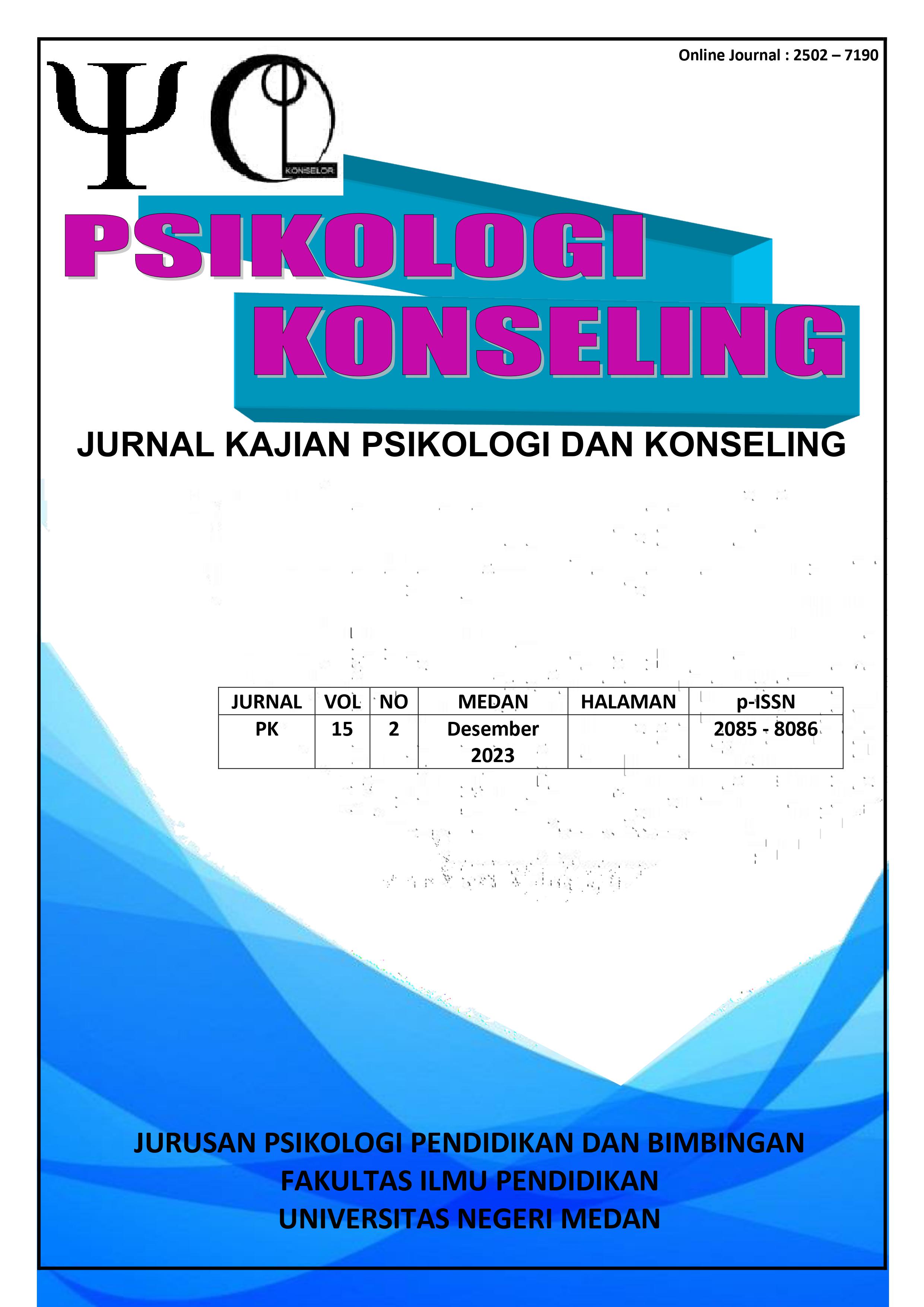PERAN DUKUNGAN SOSIAL BAGI SUBJECTIVE WELL BEING LANSIA YANG TINGGAL DI PANTI SOSIAL
DOI:
https://doi.org/10.24114/konseling.v15i2.53547Keywords:
Elderly, Social Support, Social Support Institutions, Family Social Support, Subjective Well Being, Social InstitutionsAbstract
Elderly people who receive social support are be able to have subjective well being so that they predicted to live a more productive and happier. This research aims to test which form of Social Support, sourced from the family or social institutions, who have a greater role in the Subjective Well-Being of elderly people who living in the social institutions. This research uses Social Support theory (Sarafino, 2019) and Subjective Well-Being (Diener, 2003), with quantitative research. The research subjects were 32 elderly people. The sampling technique used is simple random sampling. The validity test was measured using Jamovi with CFA (Confirmatory Factor Analysis) criteria, and the reliability test used the McDonald's Omega value with a score of 0.815 for the Social support measuring tool and a Cronbach alpha score of 0.783 for the Subjective well being measuring tool. Data collection was carried out by reading the questionnaire items one by one to the elderly. Then a statistical test was carried out using JASP version 17 and the results showed that there was a significant influence between social support and subjective well-being with a greater contribution from the social institutions than the family. Of the four types of social support and the two sources of social support, it shows that the type of companionship support that comes from the social institutions and instrumental support that comes from the family have a higher influence. Suggestions from researchers are that the social institutions continues to maintain positive support for the elderly and makes itself available to facilitate religious/spiritual activities and the family remains willing to attend and provide instrumental support to facilitate the physical activity of the elderly in the institutions.References
Asih, N. S., Yuliadi, I., & Karyanta, N. A. (2015). Hubungan antara Konsep Diri dan Religiusitas dengan Kepuasan Hidup pada Lansia di Desa Rendeng Kabupaten Kudus. Jurnal Ilmiah Psikologi Candrajiwa, 4(1), 28-39.
Cabrera, A. J. (2015). Theories of human aging of molecules to society. MOJ Immunology.
Dahliana, HS, I., & Nurhasanah. (2019). Social Support With Depression On The Elderly In The Panti Werdha Elderly Center. Idea Nursing Journal, 1-8.
Diener, E. (2009). Assessing Well-Being: The Collected Works of Ed Diener (Vol. 39). New York: Springer.
Diener, E. (2009). The Science of Well-Being. New York: Springer.
Diener, E., Suh, E. M., Lucas, R. E., & Smith, H. L. (1999). Subjective Well-Being: Three Decades of Progress. Psychological Bulletin, 125(2), 276-302.
Diener, E., Emmons, R. A., Larsen, R. J., & Griffin, S. (1985). The Satisfaction with life scale.
Eid, M., & Larsen, R. (2008). The science of subjective well being. London: The Guilford Press.
Fakhriyah, Z. E., & Corolia, F. (2021). Pengaruh Dukungan Sosial terhadap Subjective Well-Being pada Remaja dengan Perceraian Orang Tua. Prosiding Psikologi,
Indriyani, S., Mabruri, M. I., & Purwanto, E. (2014). Subjective well being pada lansia ditinjau dari tempat tinggal. Development and Clinical Psychology, 66-72.
Iskandar, Iqbal, M., & Rahayu, M. (2022). Faktor Melatarbelakangi Lansia Memilih Tinggal Di Panti Jompo Darussa'adah Lhokseumawe, Aceh. Jurnal Mutiara Ners, 5(1), 38-47.
Iskandar, Iqbal, M., & Rahayu, M. (2022). Faktor yang melatarbelakangi lansia memilih tinggal di panti jompo Darussa'adah Lhokseumawe Aceh. Jurnal Mutiara News, 38-47.
Jasman, N. V., & Prasetya, B. E. (2023). Hubungan Antara Dukungan Sosial Teman Sebaya dan Subjective Well Being Pada Anak Jalanan Di Kota Jayapura. Open Journal System, 17(6), 1087-1098.
Maddux, J. E. (2018). Subjective Well-Being And Life Satisfaction. New York: Routledge.
Mulyati, & Kenty Martiatuti, R. (2018). Pegaruh dukungan sosial keluaga terhadap kualitas hidup dan kesejahteraan lansia. Jurnal kesehatan keluarga dan pendidikan, 1-8.
Nurrohmi. (2020, Juni). Dukungan sosial keluarga terhadap lansia. REHSOS: Jurnal ilmiah Rehabilitasi Sosial, 2(1), 77-88.
Nurrohmi. (2020). Dukungan sosial keluarga terhadap lansia. Jurnal ilmiah rehabilitasi sosial, 77-88.
Rekawati, E. S. (2020, April). Dukungan Penghargaan keluarga berhubungan dengan kualitas dan kepuasan hidup lansia di Depok. Jurnal Penelitian Kesehatan Suara Forikes, 11(2), 166-169.
Santoso, M. D. (2019, April). Dukungan sosial meningkatkan kualitas hidup lansia: review article. J.K.Mesencephalon, 5(1), 33-41.
Saputri, M. A., & Indrawati, E. S. (2011, April). Hubungan antara dukungan sosial dengan depresi pada lanjut usia yang tinggal di panti wreda Wening Wardoyo Jawa Tengah. Jurnal Psikologi Undip, 9(1), 65-72.
Sarafino, E. P., & Smith, T. W. (2019). Health Psychology: Biopsychosocial Interaction. Hoboken, New Jersey: John Wiley & Sons Inc.
Watson, D., Clark, L. A., & Tellegen, A. (1988). Development and Validation of brief measures of positive and negative affect; the PANAS scale. Journal of Persoyality and Social Psychologu, 54(6).
Windri, T. M., Kinasih, A., & Sanubari, T. P. (2019). Pengaruh Aktivitas Fisik Dengan Kualitas Hidup Lansia Hipertensi Di Panti Wredha Maria Sudarsih Ambarawa. Jurnal Mitra Pendidikan (JMP Online), 3(11), 1444-1451.
Downloads
Published
How to Cite
Issue
Section
License
Copyright (c) 2023 Dyah Titi Setyaningrum

This work is licensed under a Creative Commons Attribution-ShareAlike 4.0 International License.
This work is licensed under a Creative Commons Attribution-ShareAlike 4.0 International License.




